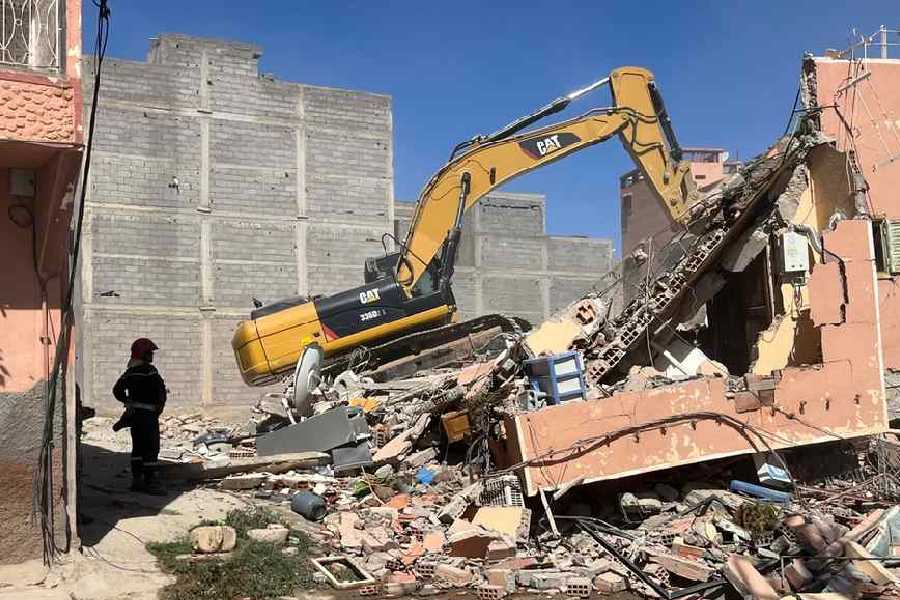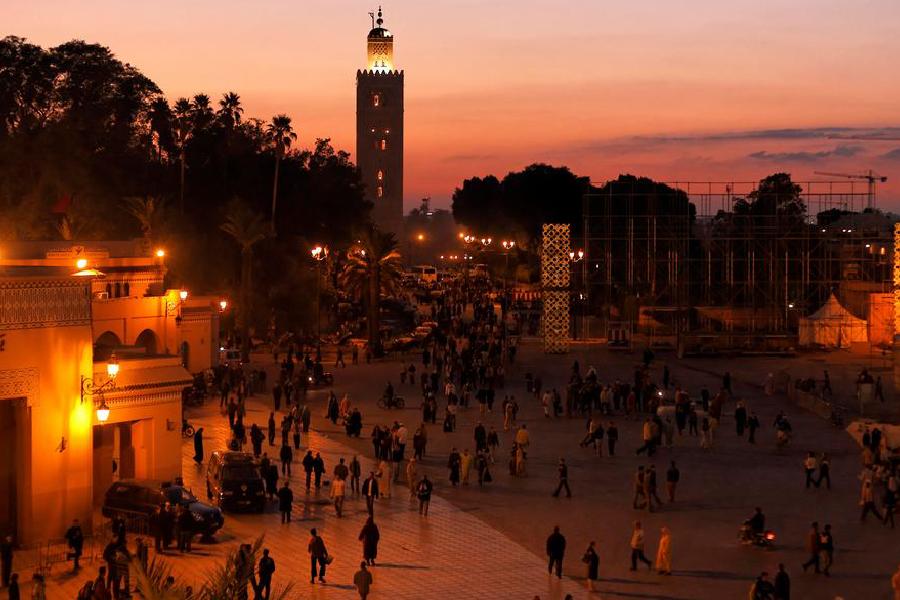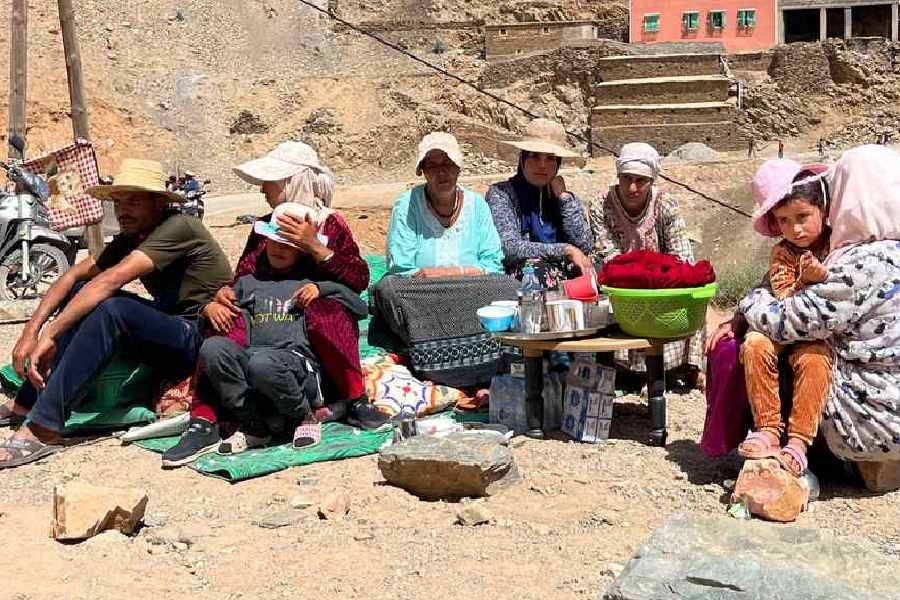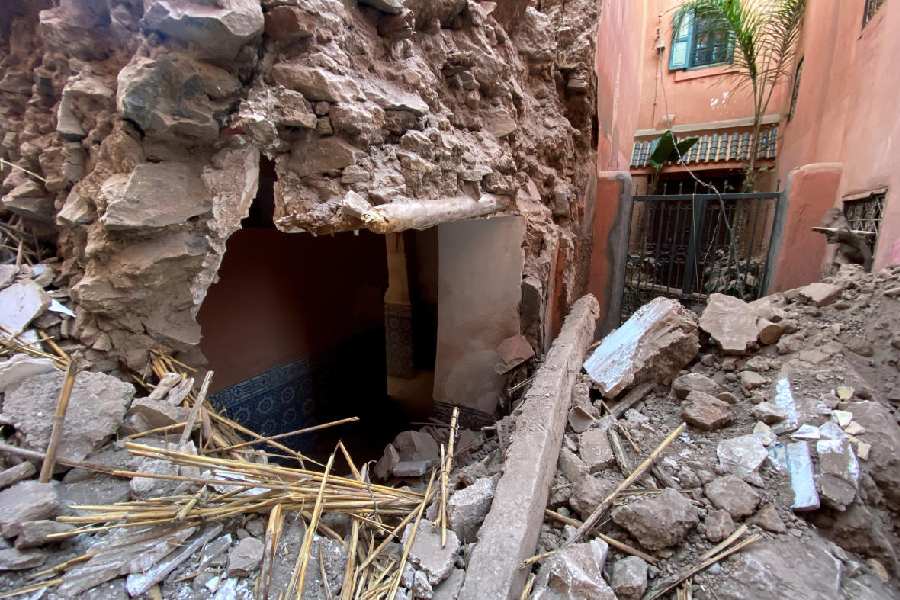In the small Moroccan city of Amizmiz on Sunday, rescue workers were still struggling to free people trapped beneath the rubble of buildings after a magnitude 6.8 earthquake struck Morocco late on Friday night at around 11 p.m.
Rescue organizations say that the first 72 hours after a quake are critical to save lives. After Monday night, the survival rate will fall to between 5% and 10%.
"It's indescribable," Naima Oufkir, a resident in the city of around 14,000 people, told DW. "My neighbor was pregnant, now she's lying under the rubble somewhere. We're praying she's still alive."
The epicenter of the earthquake was near the town of Oukaimeden, about 90 kilometers from Amizmiz, and was felt as far away as the Moroccan capital, Rabat. It is the biggest earthquake to hit the country in over a century and the death toll currently stands at more than 2,000 people.
No way into worst-hit areas
Rescue teams are trying to make their way into areas closer to the earthquake's epicenter. Many of the mountain towns and villages nearer the epicenter in Al Haouz district, about 70 kilometers south of Marrkech, are remote and often under resourced.
"These places are very remote and it's very difficult to access them," said Anja Hoffmann, head of the Rabat office for Germany's Heinrich Boell Foundation, who has previously traveled to the affected areas. "The roads there are already tiny. Even in normal conditions, it would take people about three to four hours to get to a hospital that is comparatively well-equipped. So you can imagine what it's like when those roads are blocked."

The first 72 hours are crucial for saving the lives of those still under the rubble, as seen here in Amizmiz Deutsche Welle
There had been preparations to widen some of the main roads in this area, Abdel-Aali Harimis, a local man from Azgour, a village of about 200 people in the affected area, told DW. "But now the earthquake has ruined everything," he said. People are still trapped under the rubble in his area and as of Saturday night, no help had arrived, he said.
Some of the roads could only be used by people on foot or by donkeys, confirmed Adel Boria, another man from the same mountainous area. "Even landing a rescue helicopter would be very difficult in some of those villages," he noted with concern.
About 10 kilometers west of Amizmiz in the small mountain village of Tizi, local woman Nezha ait Hamad Ibrahim has been sleeping on the street with her family since the earthquake struck. She said her family hasn't had any help at all, and that their home was almost completely destroyed. The parts of the house that are still standing have dangerous cracks in the walls.
"The men of the family are on their way back to the house right now to salvage some things we need," she told DW. "In particular, they'll get some toys for the children, if they're still useable. I really hope nothing happens to them."
Death toll will climb
Another local from a nearby village, Hicham ait Lahsen, said in his hometown there are over 100 dead so far. "There's no stone left unturned there," he reported. "I am certain that the official death toll is going to climb even higher."
Even though the earthquake's epicenter was 70 kilometers away, the tremors also caused damage in the city of Marrakech.

Marrakech's historic city square, Jemaa el-Fna, draws millions of tourists every year Deutsche Welle
When Mourad, a waiter at the Zeitoun Cafe on Marrakech's iconic central city square, Jemaa el-Fna, first felt the earthquake, he thought it was a terrorist attack. "We are very close to the Argana cafe which was bombed before [in 2011]," Mourad explained, "which is why we thought it was a bomb."
The cafe staff evacuated their customers one by one to avoid a panic and then gathered up the belongings they had left behind. The customers returned the next day to collect everything and by Saturday evening, business at the cafe was fairly brisk once again, Mourad confirmed.
On Saturday evening, DW reporter Rim Najmi, visited Jemaa el-Fna and found it was already fairly busy with curious locals and tourists out and about. The usually bustling open-air restaurants that serve hundreds of meals to tourists here every night were even setting up tables again. This was despite the threat of aftershocks, which have been ongoing, and the fact that the 12th century mosque that towers over the square appears to have been damaged in the quake.
"As you can see, life goes on," Mourad the waiter told DW. "Marrakech has been through a lot but despite all this, the city can return to normal quite quickly."
'Aid will be needed for much longer' than next few weeks
But there were still plenty of signs of danger, Najmi observed during a Facebook Live event broadcast directly from the square. She pointed out the small piles of rubble swept up in the square and barriers to prevent anybody from entering damaged sections of the old city. People in the city are still sleeping on the streets because their damaged homes remain dangerous.
There's been a lot of solidarity in Morocco, said Hoffmann of the Heinrich Boell Foundation. On social media, locals have been asking why it has taken their government so long to invite international rescue teams into the country to help, she said. But on the streets, it's a different story.
"We're seeing a lot of offers of help and a lot of solidarity among Moroccans," she said. "Yesterday there was this huge campaign asking people to donate blood. It [the response] was really impressive. Yesterday and today the [blood donation] centers have said they can't receive any more donations and to wait until next week because blood will also be needed in the long run."
Aid organizations have said it will take months, probably years, to help Moroccans affected by the quake to rebuild and recover.
"Then it will be about keeping up this spirit of solidarity," said Hoffmann. "The earthquake will be in the news for a few weeks but the aid will be needed for much longer, for reconstruction, for building people's lives back. This will be the key question in the long run."












